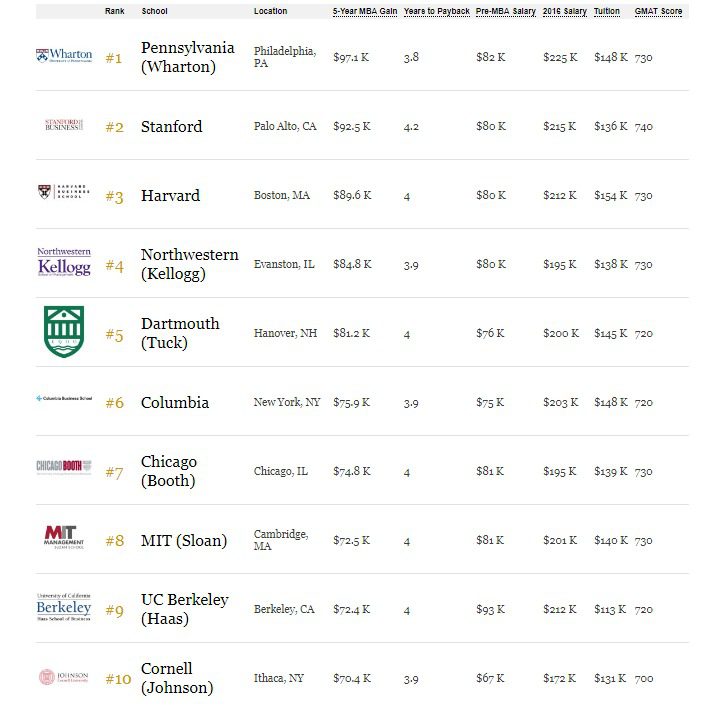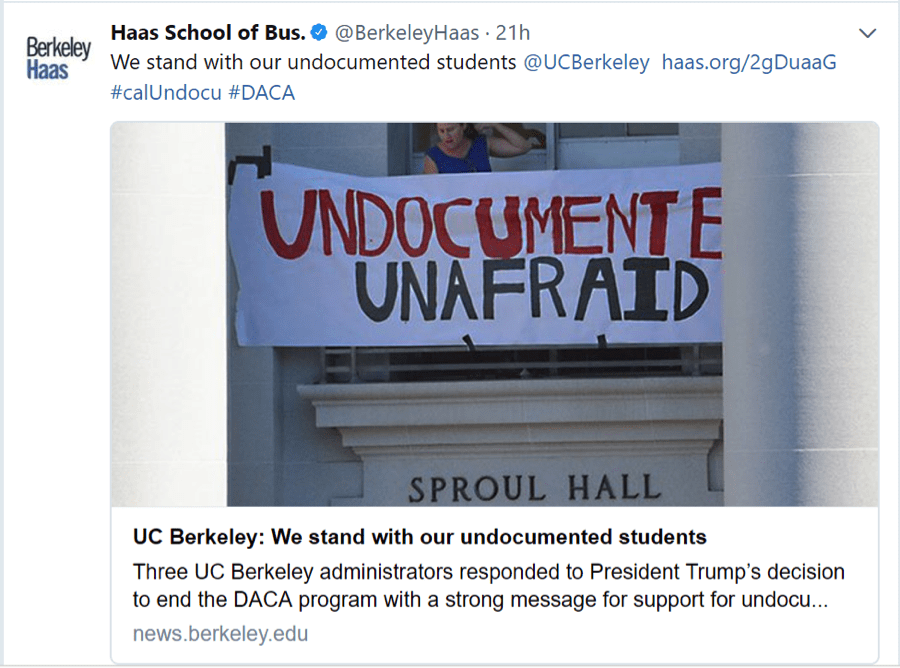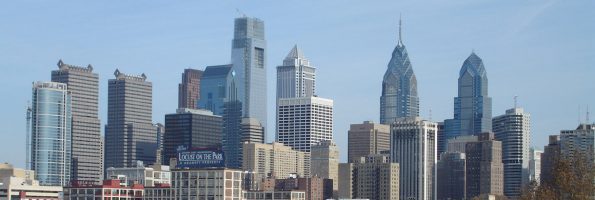Wharton, Stanford Top Forbes’ 2017 Business School Ranking

For the first time ever, the Wharton School at the University of Pennsylvania topped the biennial Forbes list of the best business school’s in the United States.
Coming in second place on the Forbes 2017 rankings, revealed earlier today, was the Stanford Graduate School of Business, which was followed by Harvard Business School, Northwestern’s Kellogg School of Management, and Dartmouth’s Tuck School of Business rounding out the top five.

Forbes‘ top 10 U.S. business schools (2017)
Rounding out the top 20 were some familiar MetroMBA favorites, such as Columbia Business School (6th), Chicago Booth (7th), MIT Sloan (8th), UC Berkeley Haas (9th), UCLA Anderson (15th), the McCombs School of Business UT-Austin (17th), and the Mays Business School at Texas A&M (20th).
Just making the final cut on Forbes’ newest list, which includes only 70 schools, was the Fox School of Business at Temple University (60th), Pepperdine’s Graziadio School of Business and Management (65th), Northeastern’s D’Amore-McKim School of Business (66th), the Kogod School of Business at American University (67th), and the Gabelli School of Business at Fordham University.
Method To The Madness
Nearly every major publication that reveals its own respective business school ranking list has its own principle methodology in which it follows. For instance, unlike Forbes, the Financial Times ranking system relies more on alumni survey responses for its final ranking. While Forbes does utilize surveys in its ranking, its primary focus is on how graduates fare on their return on investment.
In the ranking release, Forbes staff writer Kurt Badenhausen notes:
“Our ranking of business schools is based on the return on investment achieved by the class of 2012. We examined more than 100 schools and reached out to 17,500 alumni around the globe. We compared graduates’ earnings in their first five years out of business school to their opportunity cost (two years of forgone compensation, tuition and required fees) to arrive at a five-year MBA gain, which is the basis for the final rank. Schools whose alumni had response rates below 15 percent or a negative return on investment after five years were eliminated.”
In regards to Wharton topping the 2017 list, Badenhausen writes, “These days most Wharton MBA students head to finance or consulting jobs upon graduation (79 percent of the class of 2012), which traditionally are the most lucrative areas for MBAs. The concentration in these sectors pushed Wharton’s current total compensation for the class of 2012 to the highest of any school in the world at $225,000.”
YOU MIGHT ALSO LIKE: The Highest MBA Salaries in Philadelphia
The exceptional cost of living around Stanford and shockingly low admissions rates (6 percent) contributed to the business school falling off its top spot from the prior year. Stanford GSB graduates, however, were given enormously valuable stock options after earning employment, with a median value of $380,000. Despite the astronomical figures, Stanford GSB grads still saw a dip of around $40,000 in total five-year compensation compared to the Class of 2010. Similarly, HBS grads saw a $28,000 five-year drop compared to the Class of 2010. Wharton 2012 grads, in contrast, gained $18,000 compared to two years prior.
In regards to employment, not much has changed since 2012. McKinsey and Co. was the top employer of the Wharton Class of 2012, hiring over 50 of the school’s 800-plus graduates. Alongside McKinsey were Bain, BCG, and Deloitte, which are still the school’s top employers. However, since then, Amazon has overtaken Goldman Sachs in the Wharton recruitment war.
Thomas Jueng, Seoul native and 2012 Wharton grad, tells Forbes, “Wharton was a great springboard to make a transition geographically and job position-wise with a strong brand name and network as well as providing practical knowledge.”
Read the entire Forbes list of the best U.S. business schools here.
McDonough Dean Paul Almeida Delivers State of the School Address

Paul Almeida addressed faculty and staff at the annual State of the School event earlier this month. The newest dean of the McDonough School of Business discussed his vision for the school, as well as the future of business education, and commitment to interdisciplinary solutions. Continue reading…
Top MBA Programs for Producing Founders: 2017-2018 Report

Recently, PitchBook released its latest 2017-2018 Top 50 Universities Report. The ranking focused on those universities that produced the “ultimate building blocks of the venture industry: founders.”
This ranking is vastly different from rankings of top schools for entrepreneurship by U.S. News & World Report, Princeton Review, and Entrepreneur Magazine, all of which focus on factors like peer assessment surveys, curriculum, and entrepreneurial study options. Instead, PitchBook looked at a single criterion: founders of companies who received venture capital (VC) funding between January 1, 2006, and August 18, 2017, and where they went to school.
The report provides a fairly detailed breakdown of top undergraduate programs, companies (by capital raised), MBA programs, female founders, unicorns (companies that have attained the coveted $1 billion evaluation), and more. This article will focus solely on the results that relate to MBA programs, including information on female founders and unicorns.
Top MBA Programs
For the 2017-18 academic year, the top 10 MBA programs to produce founders who received VC funding were ranked as follows:
- Harvard Business School (HBS): 1,203 entrepreneurs, 1,086 companies, and $28,495 million raised
- Stanford Graduate School of Business (GSB): 802 entrepreneurs, 716 companies, and $18,259 million raised
- University of Pennsylvania’s Wharton School: 666 entrepreneurs, 585 companies, and $16,001 million raised
- INSEAD: 455 entrepreneurs, 406 companies, and $7,795 million raised
- Northwestern’s Kellogg School of Management: 445 entrepreneurs, 417 companies, and $5,680 million raised
- Columbia Business School: 441 entrepreneurs, 410 companies, and $5,465 million raised
- MIT Sloan School of Management: 437 entrepreneurs, 384 companies, and $7,797 million raised
- University of Chicago Booth School of Business: 405 entrepreneurs, 368 companies, and $5,470 million raised
- University of California – Berkeley Haas School of Business: 344 entrepreneurs, 314 companies, and $5,191 million raised
- UCLA Anderson School of Management: 247 entrepreneurs, 232 companies, and $3,957 million raised
HBS stands out immediately for producing founders who receive VC funding. Harvard produced twice as many founders as its next closest competitor, and those founders pulled in $10M more in funding for their 1,000+ companies.
As for the reason behind Harvard’s success, there are multiple elements that contribute to its production of entrepreneurs. The school is home to the Arthur Rock Center for Entrepreneurship, which offers programs for budding entrepreneurs including curricular offerings (over a dozen courses), a New Venture Competition (which offers $300,000 in cash prizes), the Rock Accelerator, the Harvard Innovation Lab, and even a Loan Reduction program that supports graduating entrepreneurs with a one-time, need-based award of $10,000 to $20,000. HBS’s extensive alumni network also provides students with connections with managing directors, partners, and founders of top VC firms including Bain Capital Ventures, Apax Partners, and Accel Partners.
Another standout for the 2017-2018 year was INSEAD. The only non-U.S. MBA program to appear in the top 10, it also moved up a spot this year over last. INSEAD grew from 393 entrepreneurs, 348 companies, and $6,131 million in capital raised to 455, 406, and $7,794 million respectively.
INSEAD’s students are supported by the INSEAD Centre for Entrepreneurship (ICE), which was founded in 2003. The center offers MBA students a chance to participate in the INSEAD Venture Competition (IVC), Entrepreneurship Bootcamps, and the Entrepreneurship Teaching Innovation (ETI) Fund, which supports the development of the “Your First Hundred Days” elective for budding entrepreneurs.
Another MBA program of note is MIT Sloan School of Management, which was fourth in capital raised on this year’s PitchBook ranking. This could indicate more successful companies coming out of MIT or a higher percentage of VC funding available to Massachusetts’ graduates.
Some of the unique entrepreneurship opportunities available from other top programs include Stanford GSB’s Startup Garage, an intensive, hands-on project course for MBA students, as well as MIT Sloan’s Martin Trust Center for MIT Entrepreneurship, which includes an accelerator, coaching, and various events. Finally, the Penn Wharton Entrepreneurship Center offers resources, events, and courses for MBAs looking to explore, develop, launch, and scale a startup.
Top Female Founders & Unicorns
PitchBook also reviewed the top MBA programs for female founders. Once again, HBS and Stanford GSB ranked first and second, respectively, with 202 and 119 female founders. Columbia Business School ranked third with 77, Wharton ranked fourth with 71, and MIT came in at fifth with 60 female founders.
As for the unicorns, the top five MBA programs are similar to the previous lists.
- HBS: 22 entrepreneurs, 17 companies
- Stanford GSB: 14 entrepreneurs, 11 companies
- Wharton: 11 entrepreneurs, 8 companies
- INSEAD: 8 entrepreneurs, 7 companies
- MIT Sloan: 6 entrepreneurs, 6 companies
This article has been edited and republished with permissions from Clear Admit.
Business, University Leaders Speak Out Against DACA Repeal

When the Trump administration formally announced yesterday that it would end the Deferred Action for Childhood Arrivals program (DACA)—putting a six-month expiration date on legal protections granted to approximately 800,000 people who entered the U.S. illegally as children—universities and business leaders were quick to condemn it. Indeed, vocal defense of the “Dreamers,” as those in the DACA program are called, resounded from Silicon Valley to the Ivy League.
“Dreamers contribute to our companies and our communities just as much as you and I,” tweeted Tim Cook, CEO of Apple and an MBA graduate of Emory’s Goizueta Business School. “Apple will fight for them to be treated as equals.” In an earlier statement Cook noted that Apple employs hundreds of people covered by DACA.
Facebook CEO Mark Zuckerberg released his own statement on his personal Facebook page. “This is a sad day for our country,” he wrote. “The decision to end DACA is not just wrong. It is particularly cruel to offer young people the American Dream, encourage them to come out of the shadows and trust our government, and then punish them for it.” He added that the young people covered by DACA contribute to their communities and to the economy. “I’ve gotten to know some Dreamers over the past few years, and I’ve always been impressed by their strength and sense of purpose. They don’t deserve to live in fear.”
DACA was enacted in 2012 under former President Barack Obama by executive order, allowing individuals who were brought to the United States as children or teens before mid-2007 to apply for protection from deportation and work permits. To apply, they had to be younger than 31 at the time the program was created, have come to the U.S. before turning 16, and have lived in the U.S. for at least five years. The U.S. Citizenship and Immigration Services reports that roughly 788,000 have had their requests for DACA status accepted.
University and Business School Leaders Denounce DACA Repeal
A Center for American Progress survey of roughly 3,000 DACA recipients found that approximately 72 percent of respondents were in higher education, 13 percent of those pursuing master’s degrees. And leaders in higher education—including at several leading business schools—were every bit as vocal as major business leaders in calling out the Trump administration’s decision and pledging their support to Dreamers.
Geoffrey Garrett, dean of the University of Pennsylvania’s Wharton School, called the repeal of DACA “bad for the economy and bad for society” in a tweet that also expressed his support for an official statement issued earlier in the day by University of Pennsylvania President Amy Gutman.

Maryellen Reilly, Wharton Deputy Vice Dean for Admissions, financial aid and career management, quoted from Gutman’s statement in her own tweet: “At Penn, we are committed to providing a safe and welcoming environment for all of our students and we will do everything we can…”

Columbia University, home to Columbia Business School (CBS), issued its own statement in opposition to the repeal of DACA. “Columbia unequivocally opposes the ending of DACA and is working with others in higher education to urge Congress and federal officials to reinstate DACA’s protections and protect the rights of those with DACA status during and after the ‘wind-down’ process that has been announced,” it read. It went on to add that in keeping with Provost John Henry Coatsworth’s November pledge, “our policies and plans aim to ensure that students who had DACA coverage are able to proceed unimpeded with their studies and that all students in the community feel safe and understand beyond question that Columbia’s dedication to inclusion and diversity, including of undocumented students, is and will remain unwavering.” CBS quickly retweeted its parent university’s stance and linked to the full statement.
And the Haas School of Business at the University of California at Berkeley tweeted: “We stand with our undocumented students.” That tweet linked to a statement issued by three ranking university administrators—Chancellor Carol Christ, Vice Chancellor for Equity & Inclusion Oscar, and Undocumented Student Program Director Meng So—that called on the Berkeley community to stand with undocumented scholars at the university and beyond.

“At a time when our campus and community values are being challenged by the prevailing national rhetoric and policy making, we must deepen our resolve and commitment to our principles and to each other,” read the Berkeley administrators’ statement. “During these difficult moments, we must defend strongly held values of dignity, diversity and community.”
The Kelley School of Business at Indiana University at Bloomington, for its part, retweeted its parent university’s official statement and pledge to support all its students.

In the statement, IU President Michael A. McRobbie called out the decision to end DACA “especially in light of the administration’s prior statements expressing support for young people protected by DACA and the strong bipartisan support that exists nationwide for maintaining the program.”
McRobbie went on to underscore the university’s support of all its students. “We believe that all of our students, regardless of their background or country of origin, bring to our campuses unique perspectives and experiences that enrich our living and learning communities,” he wrote. “In doing so, they reflect who we are—and what we strive to be—as a university that provides all students with the opportunity to expand their knowledge and succeed in a place where they feel valued, respected and at home.”
In fact, IU features an entire website—DACA @ IU—dedicated to helping DACA students at the university. On the website, the university states that though bound by state and federal laws, it will take steps to support all IU students regardless of documentation and will only inquire into a person’s immigration status when required by law. IU also provides counseling and support to students who have immigration-related concerns, including connecting students with available resources for educational and living expenses.
Penn, Columbia, Berkeley, and IU are just a few of countless schools that spoke out against the Trump administration’s decision. Prior to the final decision to end DACA, 600 college and university presidents signed a statement promoting DACA back in November. Even more recently, Duke University’s President Vincent E. Price wrote a letter in support of the program, and University of Michigan President Mark Schlissel made a statement as part of the university’s September 1st convocation saying, “I would like to reiterate to all of our students, from our own state, elsewhere around the country, and from all around the world, that you are welcome here … You make us a stronger university and enrich our community and nation by your many talents, hard work, and the diverse perspectives and life experiences you bring to campus.”
As information continues to be provided by the Trump administration, many universities and schools are preparing to provide up-to-date information for their DACA students and all who are affected. Check in with your school for more information.
This article has been edited and republished with permissions from Clear Admit.
Admissions Tip: Deadlines

Anyone who’s familiar with the MBA application process knows that August moves forward at an accelerated pace, and come September, entire weeks seem to disappear. To help this year’s Round One applicants avoid the classic time crunch, today’s blog post offers some basic advice on how to approach the Round One MBA deadlines at a reasonable pace.
Let’s start by taking a quick look at a handful of the earliest deadlines for the top MBA programs:
September 6: Harvard Business School
September 8: Cambridge / Judge
September 12: Duke / Fuqua
September 13: Yale SOM
September 15: London Business School
September 19: Stanford GSB, Penn / Wharton, Notre Dame / Mendoza (Early Deadline)
September 20: Northwestern / Kellogg, INSEAD
September 21: Chicago / Booth, Berkeley / Haas
September 25: MIT Sloan
September 29: Oxford / Saïd
For a full list of deadlines, check out Clear Admit’s post here.
Though some schools have yet to announce their deadlines (such as UMD Smith and UCI Merage, one can still get a sense of the lineup of R1 deadlines. Here are a few tips to keep in mind when creating your personal timeline.
Plan to be busy in August.
Yes, it can be tempting to work on one’s tan instead of one’s essays. However, many MBA applicants squander the month of August only to wake up in September and realize that they cannot make their target deadlines. If you are not bogged down by professional obligations in August, this makes for a great opportunity to devote time to working on your MBA applications in the evenings. The last weeks of summer can easily be split between résumé drafting, essay writing, recommendation coaching, GMAT prep, school research, and more.
Think carefully about the timing of the R1 MBA deadlines.
Looking at the deadlines above, it becomes clear that some deadlines may be easier to make than others. A candidate applying to Haas and London Business School could have a leisurely October when compared to someone targeting Haas, London Business School and NYU Stern (Oct. 15, 2017 Round 1 Deadline). Assuming about three weeks of research and writing for each school’s application, take a look at the deadlines and count backwards to determine a start date for each. It is entirely possible to meet back-to-back deadlines, such as Tepper and Darden, but doing so requires a well-planned schedule and consistent progress.
Consider taking some time off from work.
We realize that many MBA applicants work 70 hours per week and haven’t had a day off in months. For such applicants, a day or two out of the office can really do wonders for focus and organization. Applying to business school is a serious undertaking, and in the long term you won’t regret having given yourself enough time to prepare strong applications. Many successful candidates take a week off in early September to make the final push. It’s not a glamorous way to spend your vacation time, but an offer to attend a leading MBA program can make the sacrifice well worth it.
Get your recommenders on board early.
While some of the schools have not yet made their online applications and recommendation forms available, it’s a good idea to engage your recommenders early and inform them about the process and your timeline. Sit down with each recommender, perhaps over lunch or coffee. Present them with an outline of the deadlines and the process. It’s then a wise idea to meet again once the forms are available, and by that time many applicants are in a position to share their background materials (a résumé, career goals essays, etc.) to help their recommenders understand—and support—their message.
Happy planning!
This article has been edited and republished with permissions from Clear Admit.
Getting Paid: The Highest MBA Salaries in Philadelphia

Philadelphia: The City of Brotherly Love—or shove, depending on which out-of-town sports jersey you might be wearing out in public.
